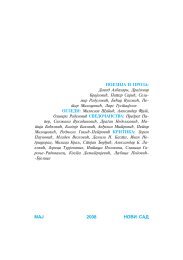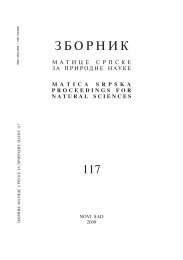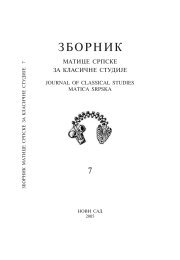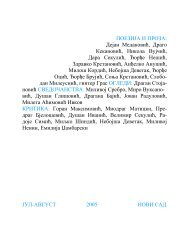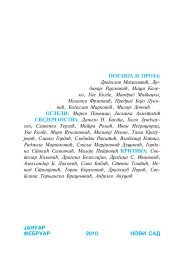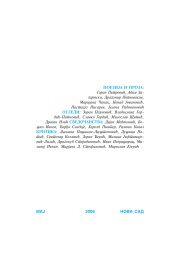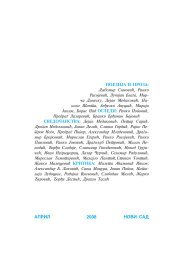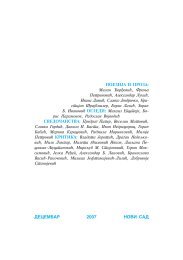You also want an ePaper? Increase the reach of your titles
YUMPU automatically turns print PDFs into web optimized ePapers that Google loves.
HERMES (Hymns 4, 18, and 29; also 19 to his son Pan<br />
and 29 to Hestia)<br />
The long, lacunose, and stylistically unusual Hymn No. 4 to<br />
Hermes probably dates to the late 6 th or even early 5 th -century. Nevertheless<br />
it provides much information about the Thief-god, worker<br />
by night, etc. that assists us in interpreting the Odyssey. The god's<br />
ingenuity in making things recalls Eumaeus' rustic skill — fashioning<br />
leather shoes, for example (14.23—24): facility in handling<br />
cowhide is a Hermetic craft (Hymn 4.49 and 124). Hermes' connection<br />
with willow plants and their pliant branches, suitable for plaiting<br />
or tying, is also important to beat in mind when reading<br />
Odyssey, where willow trees are named (øtçai, paired with Persephone's<br />
black poplars at 10.510) and when Odysseus uses osiers<br />
(lÿgoi) to effect the escape of his surviving comrades from the<br />
Cyclops' cave (9.427) and to haul the body of a giant stag he slew<br />
on Circe's isle (10.166—169). The central action of cattle-theft parallels<br />
the key element of the Cyclops episode of Book 9, where the<br />
hero's escape with six of his sailors is, besides escape, theft of the<br />
monster-shepherd's finest rams. 18<br />
Although the rest of Hymn No. 18 tells us nothing we didn't<br />
know already from the long No. 4, in the final hexameter of the<br />
shorter poem Hermes is xarid3thj. This does is not mere redundancy<br />
with the familiar epic d3thr [or -wr] ÑÀwn, “grantor of good<br />
things", frequently attached to the youthful god, but rather refers to<br />
gratification that his gifts bestow. He is thus source of emotional,<br />
not just practical benefit, which allies his work with that esthetic<br />
“joy" which Ègla2 ¿rga of Athena's or Hephaestus' crafts excite<br />
in their viewers. That Maia's son is a connoisseur of pleasing sights<br />
we know from that extended moment in the Odyssey (Book 5,<br />
63—76) when he stops and stares at the beautiful scene on Calypso's<br />
isle, a place so marvelous to see that the visitor from<br />
Olympus stops to admire it; while he himself is “most pleasing" to<br />
see when he appears as a young mortal man to old Priam and the<br />
royal herald at Il. 24.347—348 and (immediately recognizable to<br />
Odysseus) at Od. 10.277—279. We may, in fact, suspect that part<br />
of Athena's amusement on Ithaca in Odyssey 13 as she teases<br />
Odysseus is her borrowing of her brother's disguise when she presents<br />
herself in the likeness of a “young man, overseer of flocks,<br />
quite elegant, such as sons of noble lords are" and Odysseus is delighted<br />
to see [her] (222—226).<br />
When Hermes uses the aforementioned laurel fire-stick as fire-<br />
-maker thus may also be appropriating some of Hephaestus' fire<br />
(båh klyto‡ =Hcaåstoy, l. 115).<br />
56




